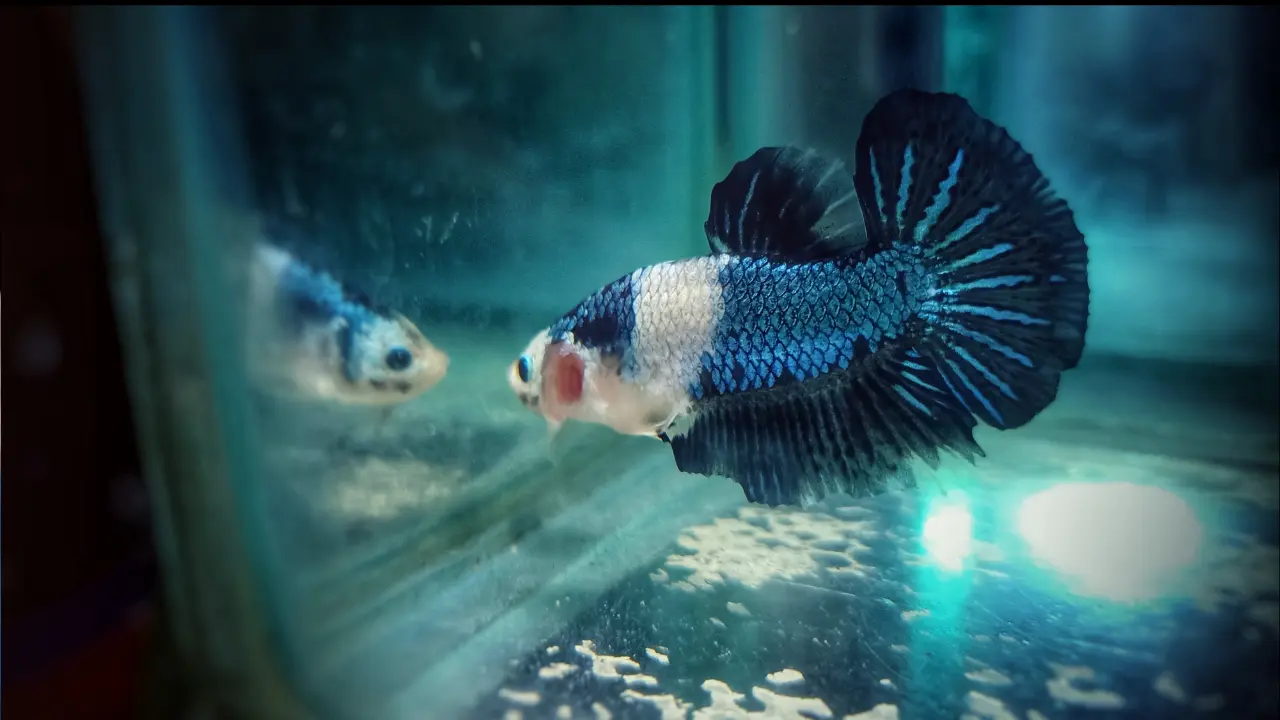We understand that it’s not always possible to be around your fish. Sometimes you could get busy, stay a day out, or plan a vacation. After all, you can only be at one place at a time, so it’s okay to miss a day or two of feeding your betta. In this article, we will discuss the survival capabilities of Betta and how it can go on for days without food.
Here’s What You’ll Learn
In this article we will help you understand:
- how long can betta fish go without food
- The survival mechanisms of Betta fish during food deprivation.
- Factors that affect how long they can go without food.
- Practical tips to ensure your Betta’s health when you’re away.
Cut to, the main question is:
How Long Can Betta Fish Live Without Eating?
Yes! Betta fish are known for their ability to stay alive without food for several days. However, you must understand that starvation can negatively impact Betta’s health. Generally, the Betta fish can survive up to 10 to 14 days without food, but this period depends on many factors.

What Happens to Betta Fish without Food?
The Betta fish has many tricks up its sleeve! When the fish isn’t fed for a period of 2 to 3 days, its metabolism reduces. This way, the Betta fish can prevent issues like constipation and bloating. In this period, they manage their energy levels efficiently without needing any food.
As the third day ends, the energy reserves start to exhaust. Now, the energy levels will start to fall and the fish will feel lethargy and stress.
As the fasting extends from day 3 to day 7, the fish starts to stress out and becomes susceptible to disease. Thus, prolonged fasting puts the Betta’s health at risk. After a week with no food, the fish can have severe malnutrition and even organ failure. The body will start to break down muscles and tissues to fulfill its energy needs.
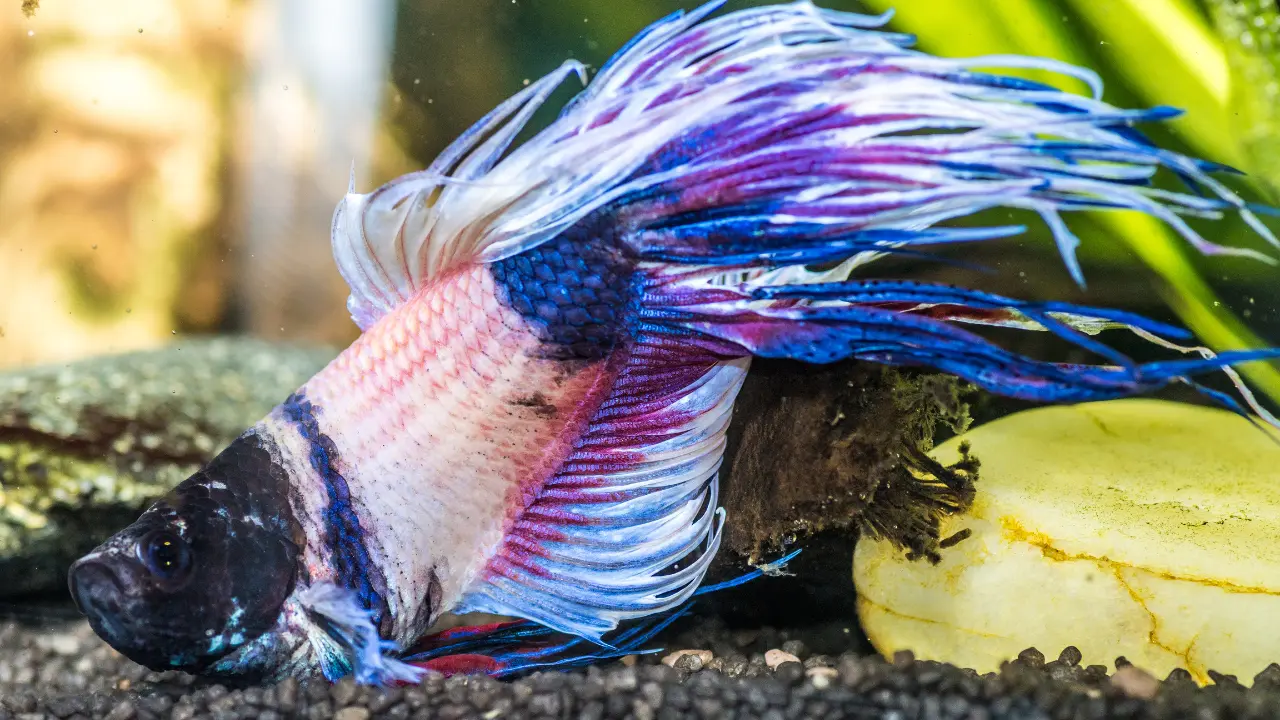
After the 7th day, the body will start to weaken with visible changes. Important organs like the Kidneys and the Liver will probably fail. Till the 14th day, the energy levels will plummet and the fish might stop moving altogether. If the Betta is not fed on the 14th day, it will most likely die.
Surviving up to 14 days is a case for ideally healthy Betta. Some fish might give up earlier! So, it’s best to fast your fish for a day and a maximum of 2 to 3 days. If you don’t feed your fish for a longer period, you will be putting its health and well-being at risk. To figure out, how long can beta fish go without eating you must consider its environment, health condition, and many other factors discussed below.
Understanding Betta’s Natural Diet
Betta fish commonly known as Siamese fish has a unique feeding nature. In the wild, Betta fish eat insects and larvae from the water’s surface. These opportunistic feeders have a protein-rich diet that maintains their natural colors. This varied diet also supports their active lifestyle. However, in captivity, they thrive on pellets, flakes, and frozen or live foods like brine shrimp and bloodworms.
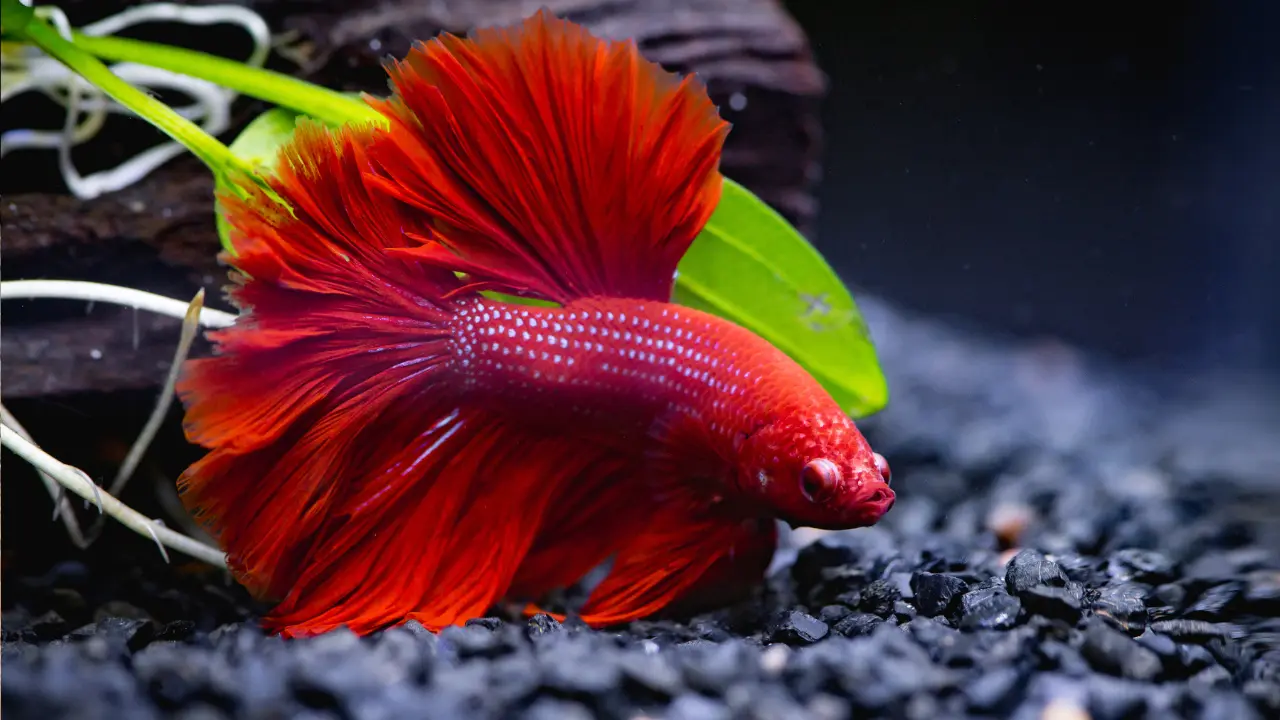
Betta fish can survive for long periods without any food intake. They have an adaptive metabolism thanks to their natural habitat’s inconsistent food supply. However, prolonged fasting can cause many health problems.
It’s best to feed betta fish after regular time intervals. Ideally, you should feed your Betta only once or twice a day. You can skip some meals for the Betta but don’t do it for long periods. If such a situation is unavoidable, we suggest using an automatic feeder.
Betta Fish Dietary Needs
To keep your Betta fish healthy, you must meet its dietary requirements. Primarily, this fish has a protein-rich diet.
You will require a complete diet schedule to feed your Betta properly. Underfeeding can make your betta sick, while overfeeding can cause diseases. Typically, 2 to 4 pallets with a frozen food treat will do for a day. Here is a detailed guide on Betta Fish Diet and Care Guide.

It’s best to use a variety of Diets to fulfill all of Betta’s nutritional requirements. Although the pellets will make up most of their diet, a little change is always better. Also, avoid diets with high fillers like corn and wheat, these are harder to digest. For a
Fasting for Your Betta
Fasting your betta fish is beneficial for its health. Betta fish often eat more than required. This overeating causes issues like constipation and bloating. The best way to avoid these issues is not to feed the fish for 24 hours.
It could be any day of the week, remember that the stomach needs some rest. Fasting mimics how Betta fish eat in the wild, where they don’t find food every day. Moreover, it prevents issues like fatty liver.
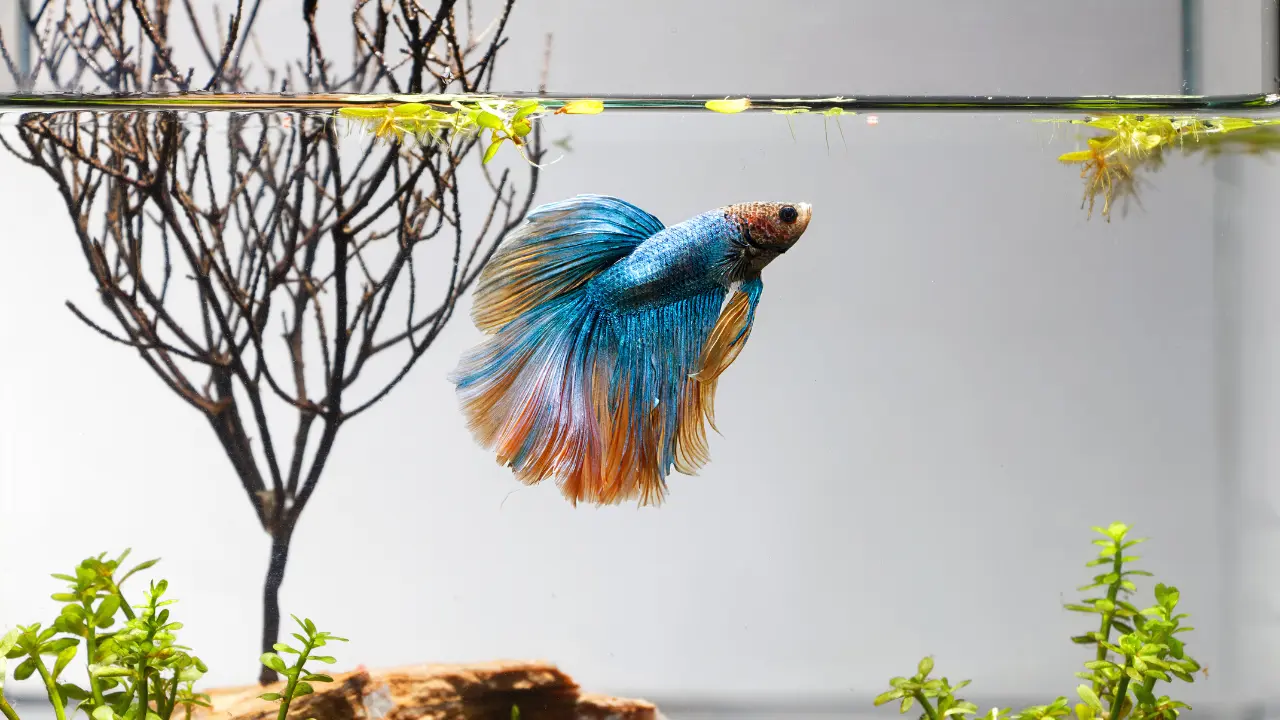
While fasting your Betta, keep an eye on its behavior. Look for signals like lethargy, discomfort, and weird swimming patterns. Ensure no stress factors are present in the tank and the water is clean.
As soon as 24 hours are complete, feed your Betta a balanced diet in appropriate amounts. Remember that overfeeding can do no good, however, it can make the fish very ill. On the other hand, not feeding enough after fasting can cause issues as well. So, it’s best to provide the fish with an ideal amount of food.
Factors Affecting Betta’s Survival
Betta fish have remarkable survival skills. It can go for days without food because of its adaptive metabolism. Here are some factors that influence how long can betta fish survive without food.

Metabolism
Betta fish have a unique metabolism that allows them to survive without food for a long period. As soon as they sense that food isn’t available, their metabolism slows down. However, everything has its limits!
The Betta metabolism is influenced directly by available oxygen and temperature. If both these factors are perfect, the Betta will have more chances of survival in a tank with no food.
If the external conditions are not ideal, Betta will have to use its energy to sustain its body temperature and osmoregulation. This way extra energy will be used and the fish will have less energy to rely on when no food is available.
Tank Size
Larger tank sizes are Better for Betta fish in many aspects. Larger tank sizes allow the fish to maintain its natural movement. Additionally, more water dilutes waste products like ammonia and nitrites. The Large water surface will allow more oxygen in the tank. This way the tank will have a cleaner and well-oxygenated environment.
Moreover, you can mimic the Betta’s natural habitat in a large tank by making a lot of caves and adding plants. These hiding spots play a crucial role in reducing stress and providing a safe space for the Betta.
Water Quality
Water Quality is very important when you leave the Betta without food. The water must be well-oxygenated, so the Betta doesn’t waste energy to gulp air from the surface. Moreover, the water must be very clean. The nitrite, nitrate, and ammonia levels must be minimal. Cut to, the fish must not be stressed due to any pollutant in the water, otherwise, it will easily catch an infection.
If you’re wondering how many days can betta fish go without food then you must consider its tank’s water quality.
Tank parameters
Water parameters have a great influence on the fish’s survival. The temperature must be between 77 to 80 degrees Fahrenheit. The pH level should be between 6.5 to 7.5. Remember that these parameters must not fluctuate. Additionally, chemical spikes must occur in the tank.
You must understand that when the fish isn’t fed, it reserves its energy to survive. In such circumstances, if it is stressed out, or has to do effort, its chances of survival will reduce drastically.
Current Health Condition
A Betta’s health condition significantly impacts the time it can survive without food. It determines how long can a betta survive without food or nourishment. A healthy Betta with a robust immune system and energy reserves will survive longer. Whereas a Betta with some disease or weak immune system might fail to survive without food.
When a Betta is in good shape, its body can store and utilize fats and proteins. However, if it’s weak and already fighting for its life, it will have minimal chances of survival without food.
Tips for Keeping Your Betta Healthy While You’re Away
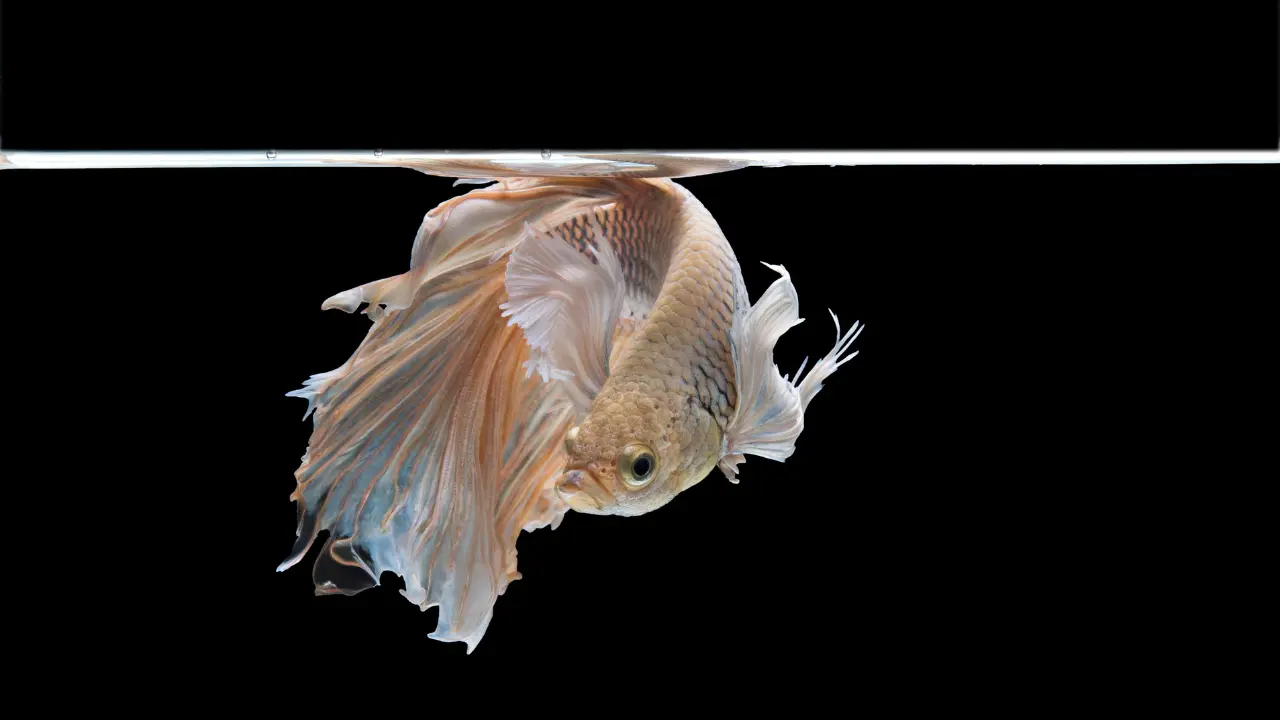
Here are some tips you could use to keep your Betta healthy and well-fed when you are not around.
- Use an Automatic Feeder
- Feed high-quality diet
- Change water partially before leaving
- Ask someone to look after your fish when you are away
- Maintain Betta’s health before leaving to increase chances of survival
Health Issues from Underfeeding
Underfeeding can lead to severe health for a Bettas fish. If the Betta is starved for a long period, it can suffer from fatal health issues. Some are mentioned as under.
Malnutrition:
As the nutritional requirements are not fulfilled, the fish will become weak. Its growth will be stunned, its immune system will become weak and it will have poor coloration.
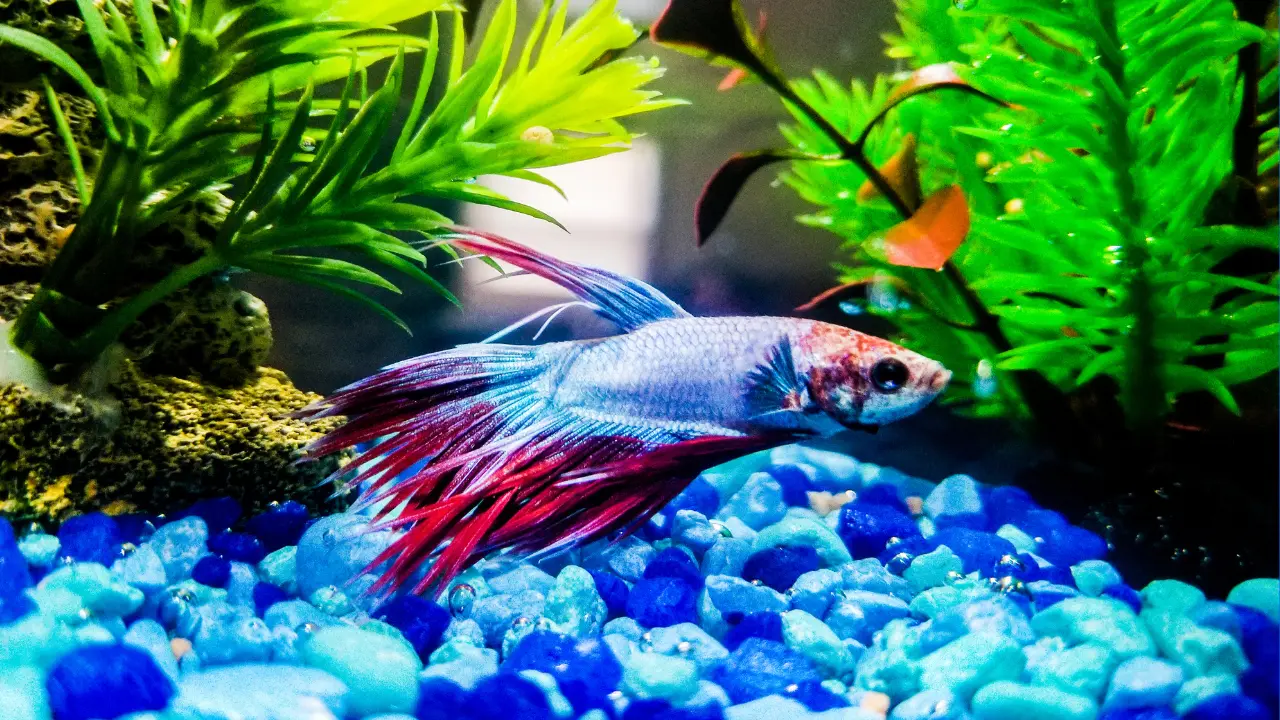
Muscle Atrophy:
When unfed, Betta fish rely on energy stored in their muscles and fats. These muscles and fats break down to provide energy. When starved for a long time, the Betta will exhaust all its energy reserves and visibly look weak. It might end up looking like a bony fish.
Immune System issue:
When Unfed for a long time, the Bettas immune system slows down. Thus, the Betta is susceptible to diseases like fin rot and infections. These diseases reduce the Betta’s chance of survival when it is already starving.
FAQ’s
Can betta fish survive 3 days without food?
Yes! A Betta fish can easily survive 3 days without food, given it is completely healthy and the tank environment is pristine. Additionally, there should be no stress-inducing factors in the tank.
Is it OK to not feed my betta for a week?
No! You should not starve your Betta for 5 days. This is highly risky as your fish will become weak and malnourished. It can also catch diseases and infections. It’s best to keep a maximum limit of 3 to 4 days of fasting.
Can a fish go 5 days without food?
No! we would suggest not to starve your Betta for more than 3 to 4 days unless absolutely necessary. However, if you don’t have a choice, be aware of the risks like weakened immunity and susceptibility to disease.
Should I use an automatic fish feeder?
Yes! You can use an automatic feeder when you are away. However, it’s best to feed the fish without an automatic dispenser because it limits the variety of foods that you can provide. After all, Bettas need a mixed diet as they are picky eaters.
how long can a Betta live without eating?
A betta fish can live up to 14 days without eating anything. However, this is an ideal case. Some Betta’s might not make it to the 14th day. You should avoid starving your fish for more than 3 to 4 days.
Conclusion
So, this was all about How Long Betta Fish Live Without Food. Wrapping everything up, we can say that a healthy Betta fish can survive without food for up to 14 days. But this period is very dangerous for the fish’s survival. So, starving Betta fish for such a long time must be avoided if possible.
However, if you plan to be away for 2 to 3 days, the Betta can manage short fasting periods. Additionally, you should consider the factors that affect the Betta’s survival. If the tank is perfect and stress-free, and the Betta is healthy, it can manage some time without food.
Lastly, we discussed the potential issues your Betta might suffer from, if starved for a long period. Give it a quick go-through to find out the risks that come with starving your Betta fish.
Let me ask: Would you Leave your Betta fish without feeding for a long time? Share your thoughts with us in the comments below!

